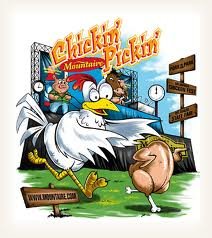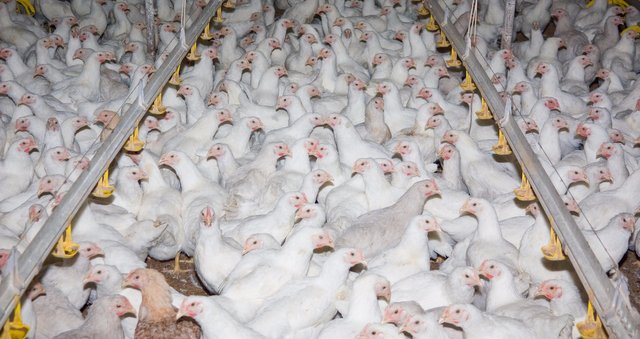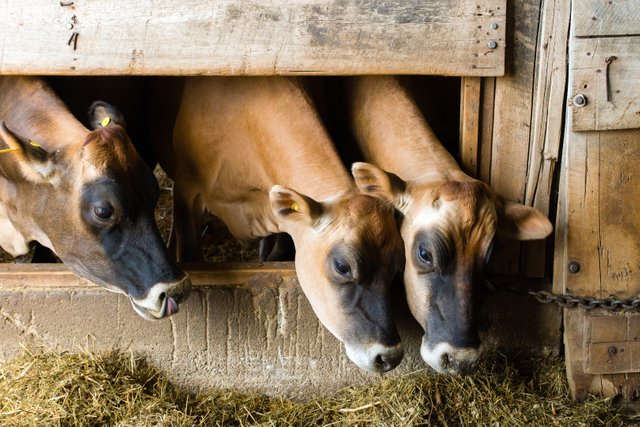The Moral Imperative to Eat Meat

This essay attempts to answer age-old questions about how the consumption of animals fits into our moral framework. Do animals suffer, and if so, does their suffering have any moral relevance? Is it immoral to eat meat, or immoral not to? What is the religious significance of butter? Should we be eating other primates?
Perhaps Rene Descartes was right when he made the compelling argument that animals don’t feel pain. After all, he was right about a lot of other stuff.
Descartes was a vegetarian for health reasons. He, did, however, skin dogs and rabbits alive for research purposes. He reasoned that if the animals felt pain then what was done to them would be so horrific that God would never allow it. Since God did, in fact, allow it, then it follows logically that dogs and rabbits don’t feel pain. There is no reason to think any other animals do, either. As Descartes went on to argue, animals don’t have souls, and without a soul, you can’t feel pain.
At this point you may be thinking, that only makes sense if there really is a God. How do we know God exists? Descartes proved that, too.
It should be noted that there are currents of religious thought which teach that the more intelligent animals do have souls. But even if this is true, just because an animal has a soul, that doesn’t mean she feels pain. It’s more likely that the complex neurochemical pathways which underlie pain perception that we share with nonhuman animals are a coincidence, and that they have an entirely different function in all nonhuman animals, not just the less intelligent ones who have no souls.
But even if animals do feel pain, does it matter? Let’s examine the issue from the perspectives of secular and religious morality.
Why Meat is Moral

Refraining from eating the flesh of animals would be unreasonable because it would be putting animals’ trivial interests in their own lives above our greater interest in eating them. After all, meat tastes really good. It’s such a treasured part of the diet that in some languages, the word for meal is “meat.”
There are some who would claim that if our actions cause the suffering of other sentient beings that is a strong reason not to do it. Libertarian philosopher Jan Narveson has powerfully refuted this claim and points out that the suffering caused to sentient nonhumans by humans is “counterbalanced by the fact that it is very much in our interests to do it.”

In a nutshell, “the question is, is our interest in the taste of animal flesh such as to justify doing the things we do to them to get them into the frying pan? My answer is, yes.” He goes on to explain, “We don’t need to justify our treatment of animals by claiming that they are in some serious sense necessary, like we would die if we didn’t eat animals. That’s not necessary at all. The fact is, if you like meat, then you’re justified in killing animals for the sake of eating meat.”
Even Peter Singer, father of the animal rights movement, acknowledges that animals have no interest in continuing to live. Of course, Singer is a nut who gives most of his own money away to poor people he’s never met, and he thinks the kind of lives animals have is important. He argues that animals have an interest in the quality of their own lives.
That may be true, just as humans have an interest in the quality of their own lives. But that doesn’t mean we should refrain from having children just because our children will suffer during their lifetimes. Life has intrinsic value. Even most humans who are deeply unhappy have the desire to go on living and do not wish they had never been born. Why should animals be any different?
If people stopped eating meat, then fewer animals would be born. As eminent economist Robin Hanson so eloquently stated in his Meat is Moral essay, by eating meat “you are not hurting animals; you are helping them.”
He points out that “we might well agree that wild pigs have lives more worth living, per day at least, just as humans may be happier in the wild instead of fighting traffic to work in a cubical all day. But even these human lives are worth living, and it is my judgment that most farm animal’s lives are worth living too. Most farm animals prefer living to dying; they do not want to commit suicide.”
Hanson explains that the more animals we eat, the more animals will be born to replace them. If we stop eating meat then those animals will never get to have a life at all. Since life on a factory farm is better than no life at all, meat is moral.
This doesn’t mean, of course, that we shouldn’t care at all about improving their lives. It is kind of us to do things that improve the lives of others, whether they be humans or animals, but it is not immoral not to. As Hanson put it, “It would be kind of you to pay a little more for your meat to improve the lives of the animals that become your meat. Just don’t confuse a lack of extra kindness with cruelty; people already do more good by buying ordinary meat than by buying veggies.”
Religious Morality
Perhaps you reject secular ethics. What, then, compels us to support the meat industry on religious grounds? All the holy books in the Western tradition advocate the eating of meat, and God explicitly gave humans dominion over animals. Furthermore, as mentioned earlier, Descartes proved that God exists and thereby established that animals don’t feel pain.
The authority of the holy books and the scientific proofs of Descartes will be sufficient for most people. But you may still have nagging doubts, or you may be one of a growing number of people who believes the Vedas offer a much better explanation of how the universe works. Quantum mechanics and superstring theorists are just now starting to discover all the things that were explained thousands of years ago in the Vedic scriptures.
People who follow the Vedas are vegetarians, but they eat a lot of dairy products, especially butter and ghee. One of the important tenets of their religion is nonviolence, so one day I asked them why they supported the dairy industry when the use of animals on dairy farms meets their definition of violence. They explained to me that if butter and ghee are properly blessed, they contain no karmic taint. The prohibition against violence is there only to help people avoid bad karma. But anything desired by Krishna and prepared with the proper rituals can have no negative karma no matter how it is procured.
“Why is that?” I asked. They just laughed at my naivete and told me that was how the universe is structured. Then they told me a charming story about Krishna as a child. Apparently he was very fond of butter and naughtly little Krishna used to sneak into the kitchen through a window to steal butter. One of his common nicknames is “the butter thief.” Apparently He is just as fond of it now.
What does this have to do with the morality of meat? No matter how many hormones you inject into cows and how sophisticated your milking machinery, the truth is that milk cannot be produced without producing lots and lots of calves. And farmers cannot just produce calves that go to waste. They must be able to cut them up and sell them. Farmers are not philanthropists, after all. They have to make a living. Lord Krishna wants butter, and without the meat industry, the dairy industry would dry up, Krishna would become unhappy, the universal dharmic order would be imbalanced and the whole structure of the universe would become deranged .
Now that we’ve established the moral necessity of supporting the meat industry, a few criticisms are in order.
A Few Words on the Inefficiencies of the Leather and Fur Industries
In order to maximize the contributions of the meat industry to human happiness, there are some inefficiencies in the leather and fur industries that should be addressed. Leather and fur are treated as commodities in their own right, and the flesh of the animals stripped of their skin and fur frequently goes to waste. To just throw the corpses into a pile and let them rot after we’ve stripped their skins is unethical. We should make full use of the animals in an attempt to create the maximum amount of human happiness we can from each animal.
Weak Arguments in Support of Eating Meat Should Be Abandoned
In order to be effective in our arguments, we must be careful to weed out any weak arguments, even if they are intuitively appealing. One such argument is that we need to eat meat in order to be healthy. It can be challenging to overcome such deeply ingrained thought patterns. But is has been acknowledged by the USDA and the ADA that a vegan diet can be healthy. We don’t want to use arguments that our opponents can effectively refute. If they defeat us on even a minor point such as this, it will give them some credibility, and they may use that to confuse the uninformed. Unsophisticated thinkers are easily swayed and may not realize that even though it’s healthy to be vegan, it is immoral.
The argument that I find most irksome is the one that it’s natural to eat meat. That just doesn’t hold any water. Murder and rape are also natural. Just because it’s natural does not mean that it is good or moral. After all, chimpanzees eat monkeys. Chimpanzees are our closest relatives, and we are theirs. But that doesn’t mean we should start eating our fellow primates. That would be ridiculous. It’s a health hazard to eat such closely related animals and it would also be in poor taste. Chimpanzees clearly have a lot to learn about common sense and morality.
We must bear in mind that we are superior as a species because of our ability to rise above our instincts and formulate morally coherent systems of thought. True compassion is knowing your place on the food chain.*
Every year, the number of animals bred for food in the U.S. increases by the hundreds of thousands. Let’s keep up the good work.
Just eat a veggie burger. Eating animals isn't necessary.
This post has been linked to from another place on Steem.
Learn more about linkback bot v0.3
Upvote if you want the bot to continue posting linkbacks for your posts. Flag if otherwise. Built by @ontofractal